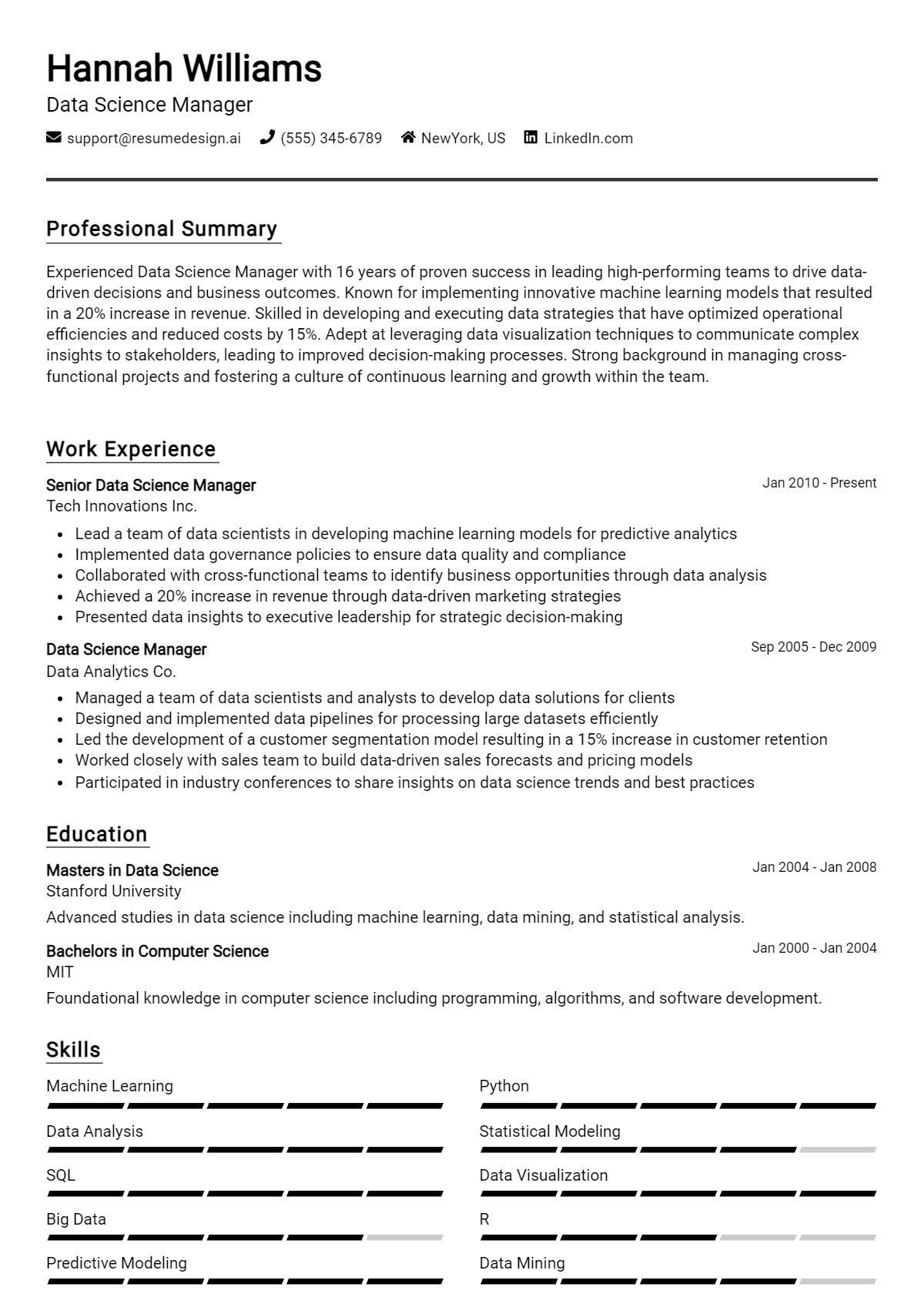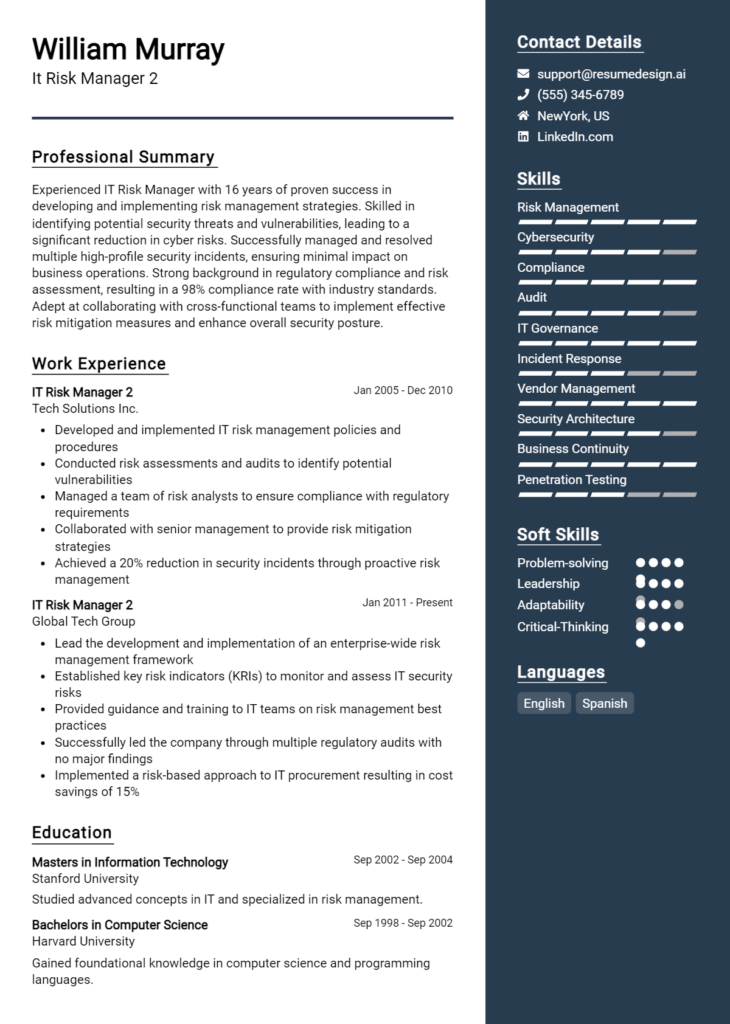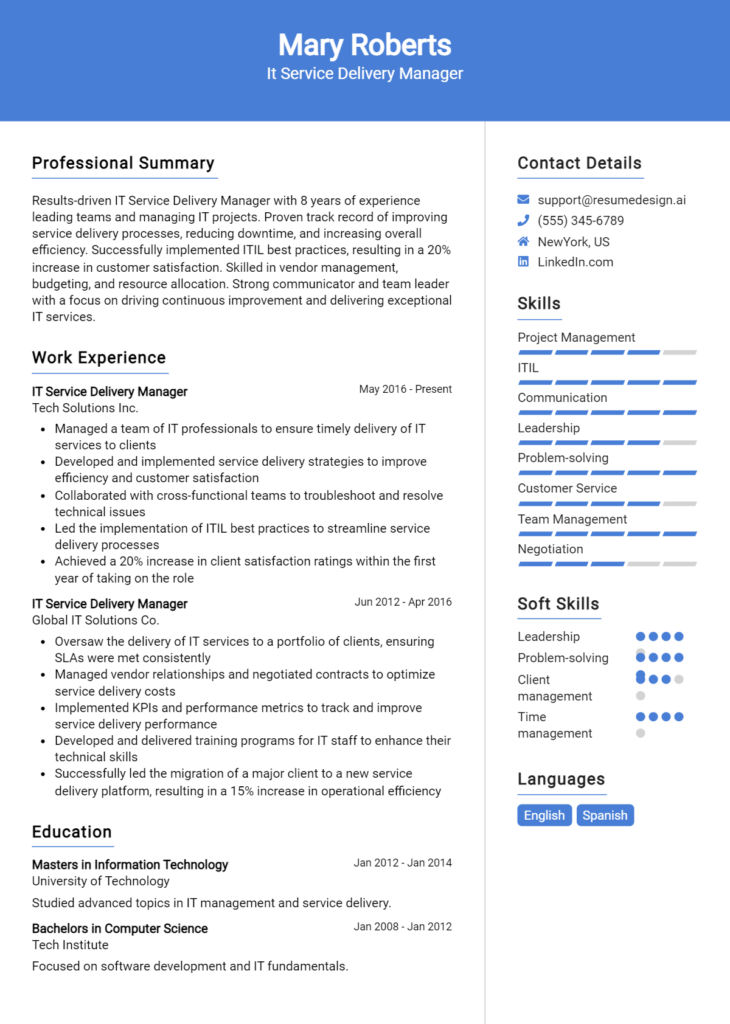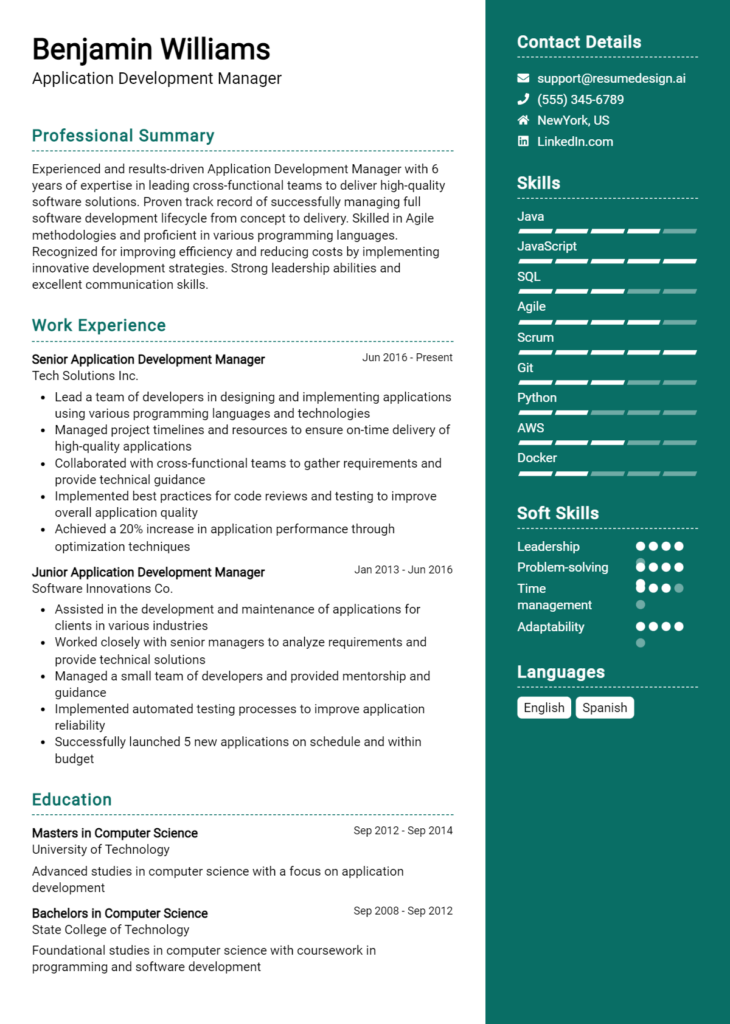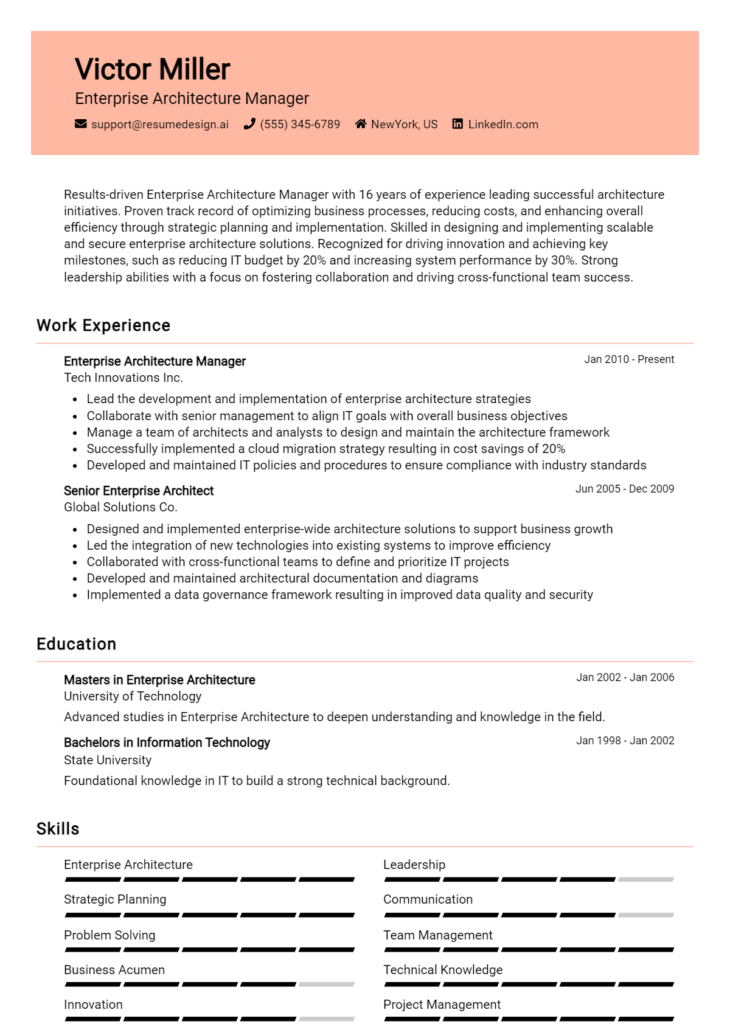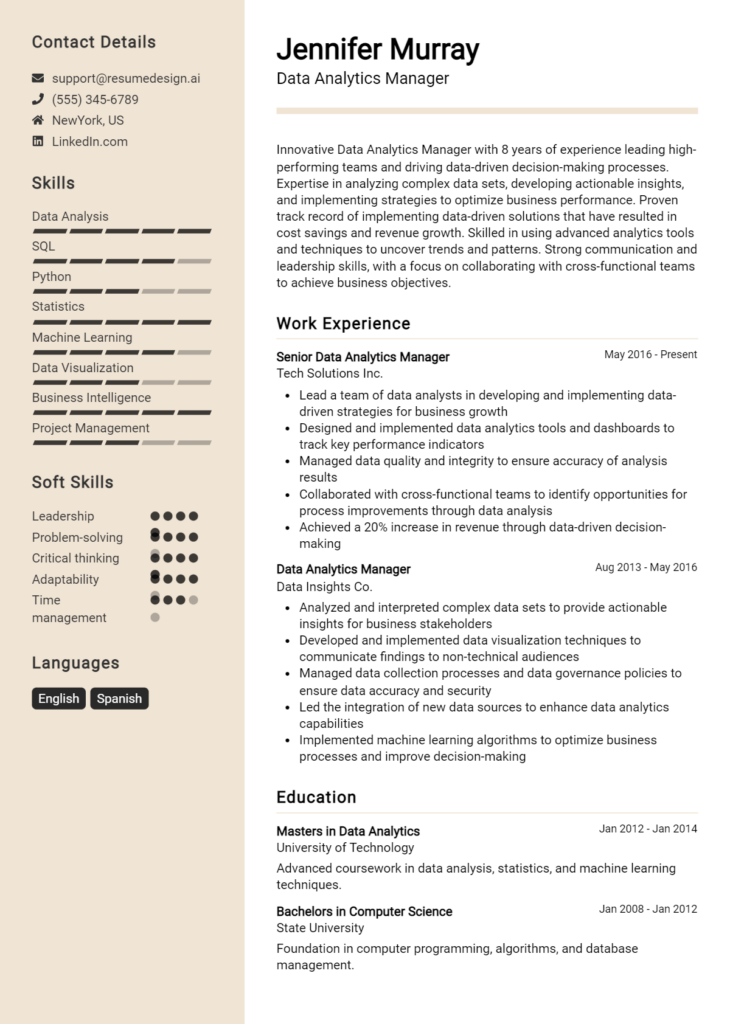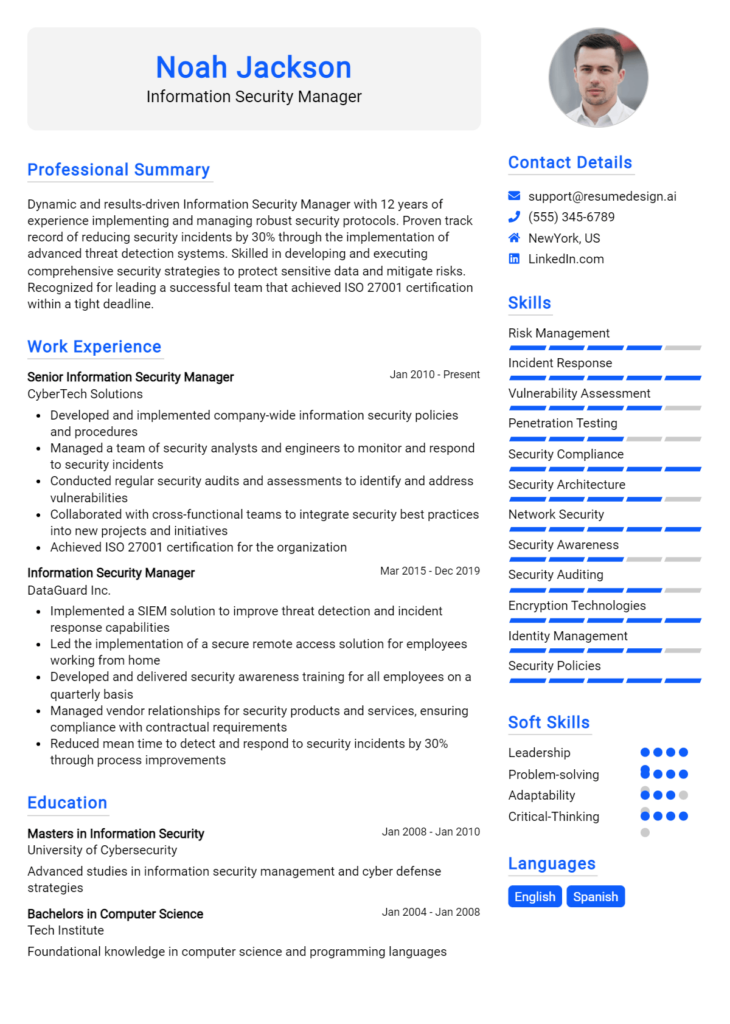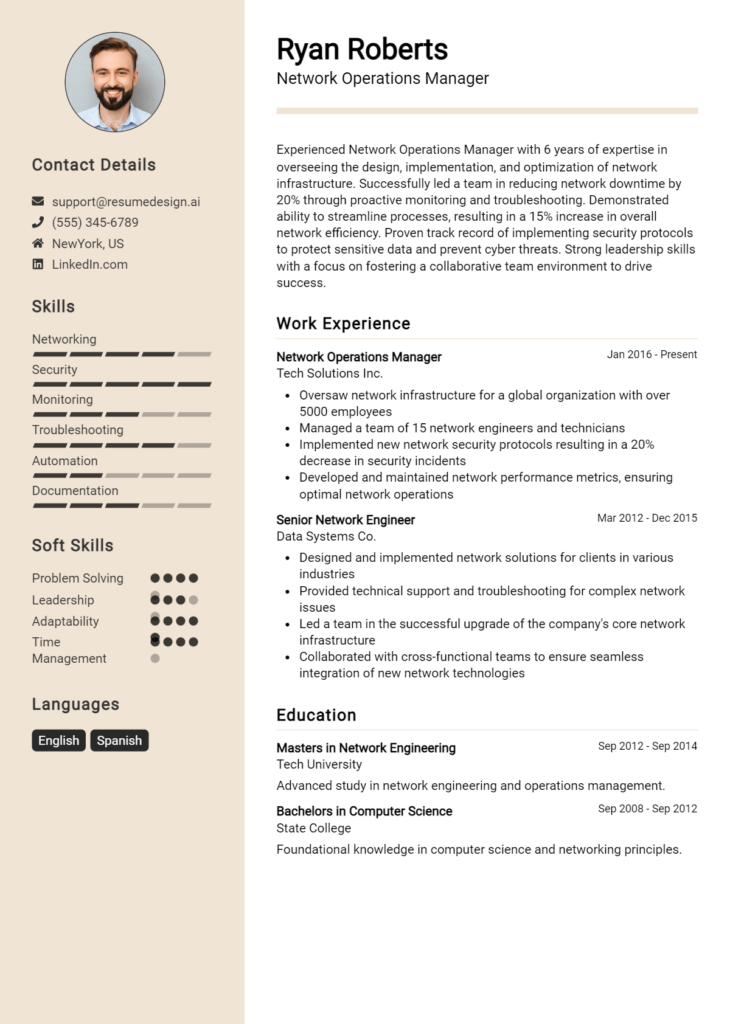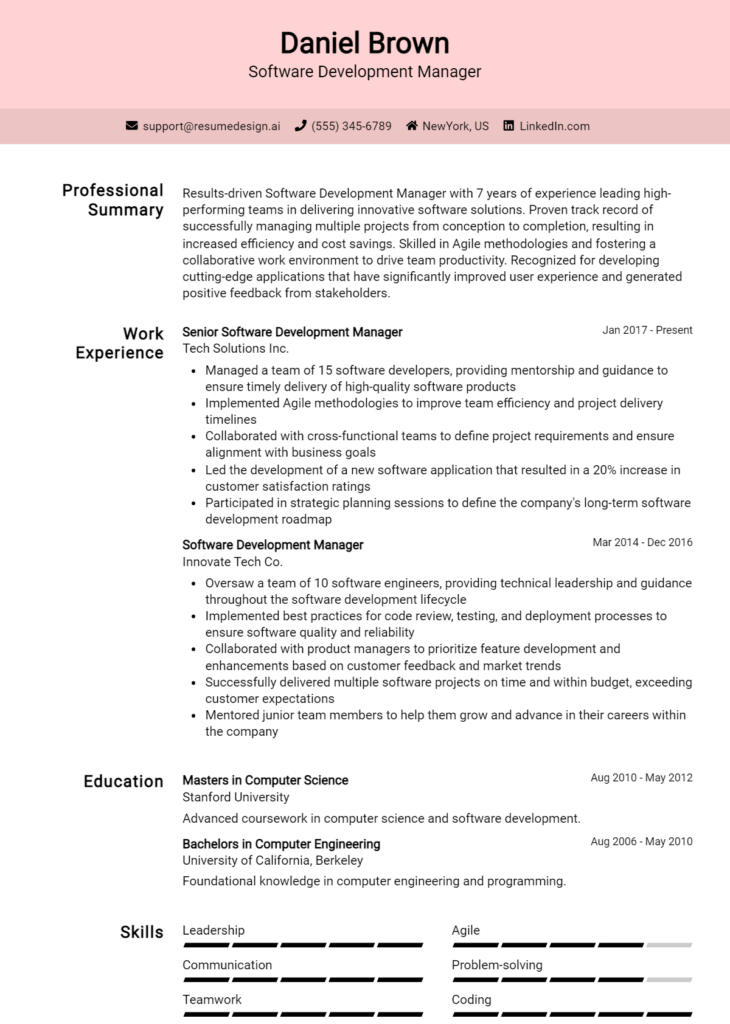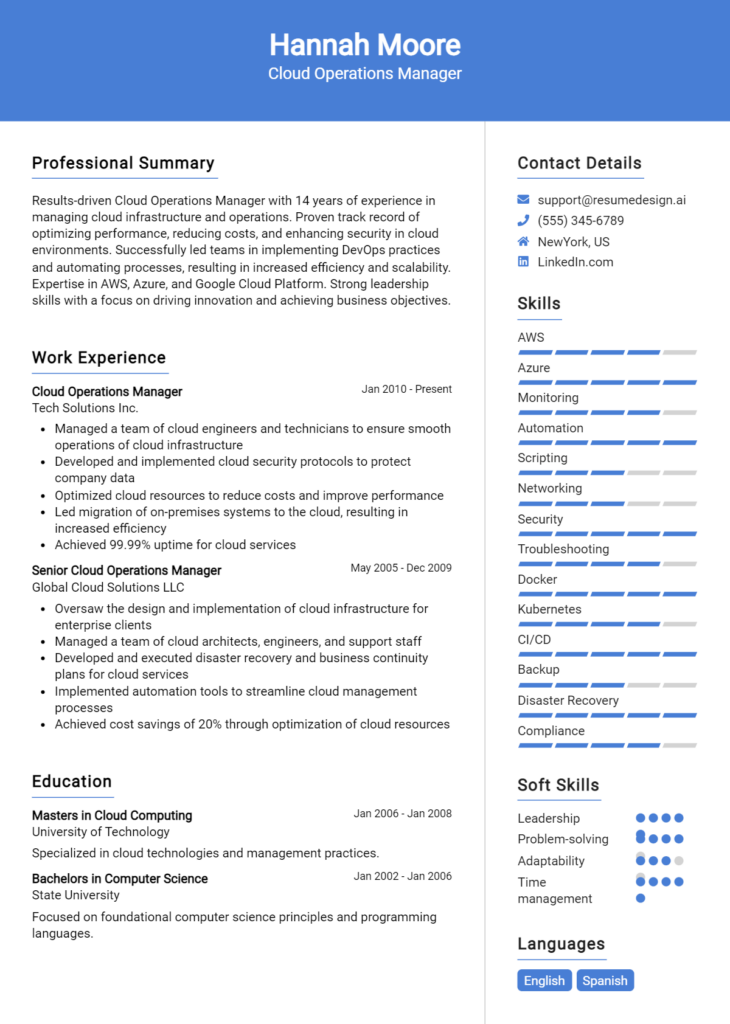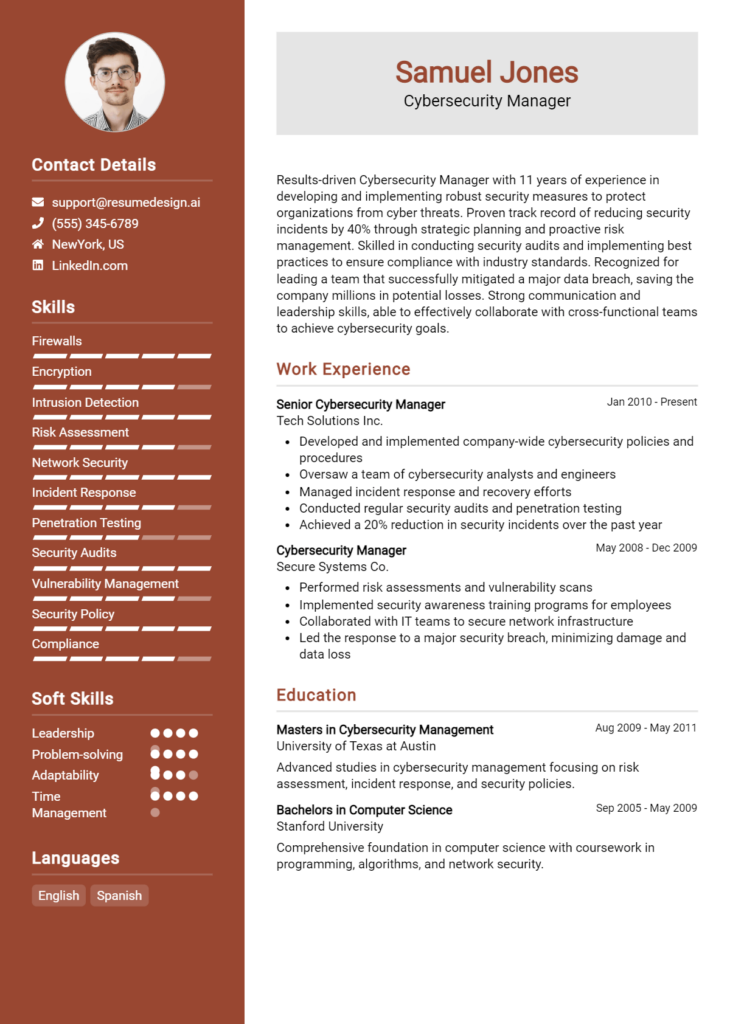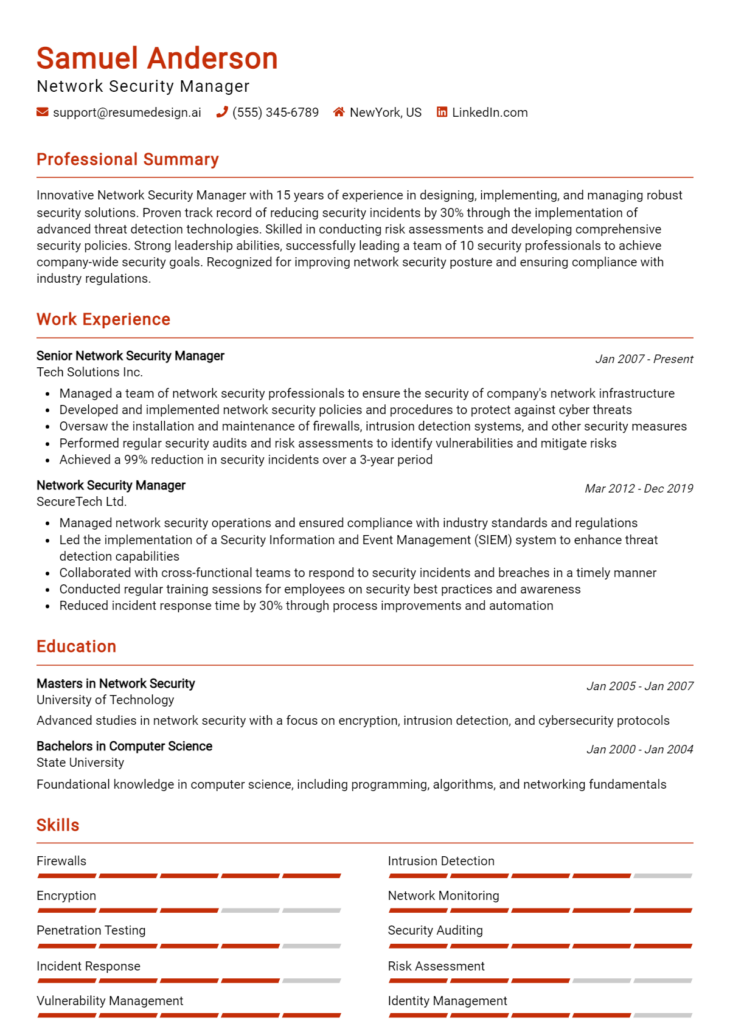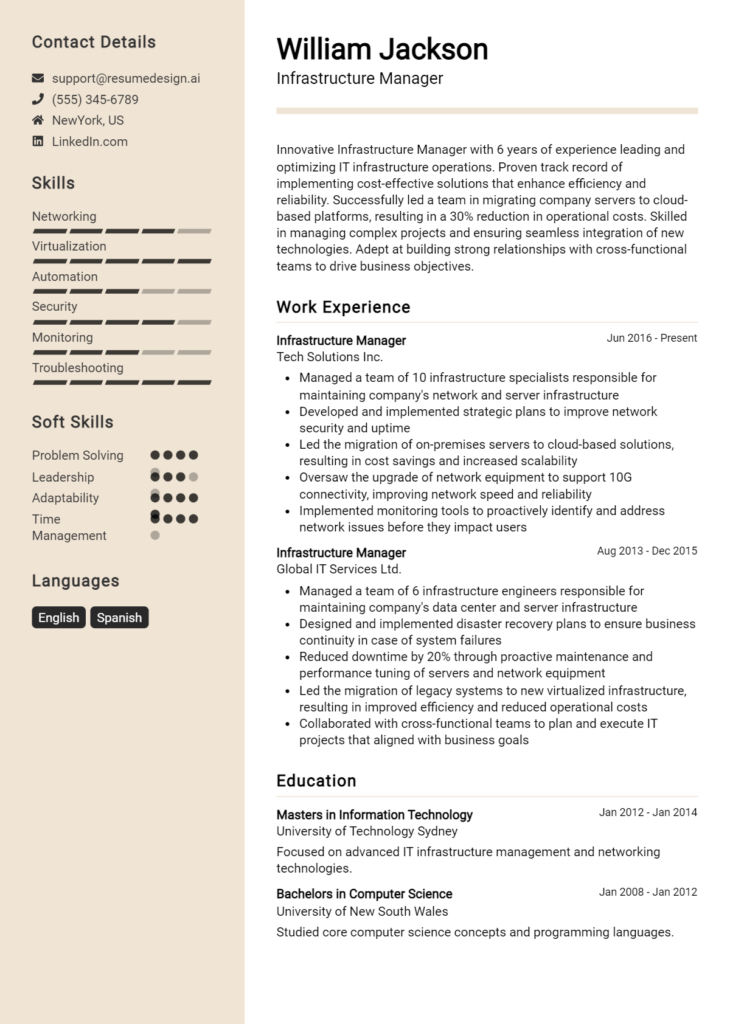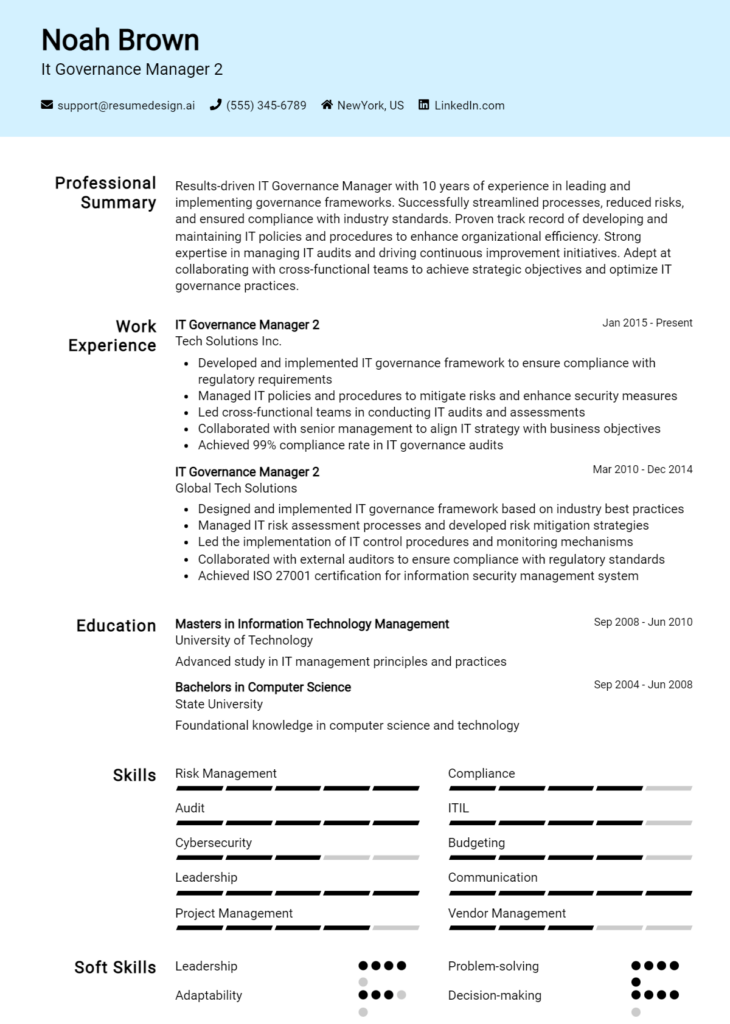Data Science Manager Core Responsibilities
A Data Science Manager plays a pivotal role in bridging data analytics with business strategy, facilitating collaboration among cross-functional teams. They are responsible for overseeing data projects, mentoring data scientists, and ensuring alignment with organizational goals. Key skills include technical expertise in machine learning, operational management, and strong problem-solving abilities. These competencies are essential for translating complex data into actionable insights, ultimately driving business success. A well-structured resume that highlights these qualifications can significantly enhance career prospects.
Common Responsibilities Listed on Data Science Manager Resume
- Lead and mentor a team of data scientists and analysts.
- Develop and implement data-driven strategies aligned with business objectives.
- Collaborate with IT, marketing, and finance departments for integrated solutions.
- Oversee the design and deployment of machine learning models.
- Ensure data quality and integrity across projects.
- Communicate findings and insights to stakeholders effectively.
- Manage project timelines and deliverables for data initiatives.
- Conduct research to stay updated on industry trends and technologies.
- Facilitate workshops and training sessions for team development.
- Analyze and interpret complex data sets to inform business decisions.
- Drive innovation by exploring new data sources and technologies.
High-Level Resume Tips for Data Science Manager Professionals
In today's competitive job market, a well-crafted resume is crucial for Data Science Manager professionals seeking to make a lasting impression on potential employers. Your resume serves as the first point of contact, offering a snapshot of your skills, experience, and achievements in the field of data science. It needs to effectively communicate your ability to lead teams, drive data-driven strategies, and deliver impactful results. This guide aims to provide practical and actionable resume tips specifically tailored for Data Science Manager professionals, ensuring that your resume stands out in the crowded landscape of job applications.
Top Resume Tips for Data Science Manager Professionals
- Tailor your resume to the specific job description, using keywords and phrases that align with the role.
- Highlight your leadership experience by detailing the teams you’ve managed and the projects you've overseen.
- Showcase your technical skills, including proficiency in programming languages, data analysis tools, and machine learning frameworks.
- Quantify your achievements with metrics, such as percentage improvements in project outcomes or increases in team efficiency.
- Incorporate relevant industry certifications or training that demonstrate your commitment to professional development.
- Focus on your ability to communicate complex data findings to non-technical stakeholders, showcasing effective collaboration skills.
- Include a section on soft skills, emphasizing qualities like problem-solving, critical thinking, and adaptability.
- Utilize a clean and professional layout, ensuring that your resume is easy to read and visually appealing.
- Keep your resume concise, ideally one to two pages, focusing on the most relevant information.
By implementing these tailored tips, you can significantly enhance your resume's effectiveness, increasing your chances of landing a job in the Data Science Manager field. A well-crafted resume not only showcases your qualifications but also reflects your professionalism and attention to detail, making you a strong contender in the eyes of potential employers.
Why Resume Headlines & Titles are Important for Data Science Manager
In the competitive landscape of data science, a Data Science Manager's resume must stand out to capture the attention of hiring managers. Resume headlines and titles play a pivotal role in this endeavor, serving as a first impression that can either intrigue or dissuade potential employers. A well-crafted headline succinctly summarizes a candidate's key qualifications and areas of expertise in one impactful phrase, making it easier for hiring managers to quickly assess a candidate’s fit for the role. It should be concise, relevant, and directly related to the specific job being applied for, ensuring that the resume resonates with the needs of the organization.
Best Practices for Crafting Resume Headlines for Data Science Manager
- Keep it concise: Aim for one impactful phrase that encapsulates your expertise.
- Be role-specific: Tailor the headline to reflect the specific position you are applying for.
- Highlight key strengths: Focus on your most impressive skills or accomplishments relevant to the role.
- Use industry keywords: Incorporate terms commonly found in job descriptions to align with employer expectations.
- Avoid jargon: Ensure clarity by avoiding overly technical terms that may not be universally understood.
- Showcase leadership skills: Emphasize your experience in managing teams and projects, which is crucial for a managerial position.
- Be authentic: Stay true to your professional identity, ensuring your headline reflects your unique qualifications.
- Update regularly: Revise your headline to align with your evolving career goals and job market trends.
Example Resume Headlines for Data Science Manager
Strong Resume Headlines
Data Science Manager with 10+ Years of Experience in Predictive Analytics and Machine Learning
Results-Driven Data Science Leader Specializing in Big Data Solutions and Team Development
Innovative Data Science Manager Focused on Driving Business Growth through Advanced Analytics
Weak Resume Headlines
Data Science Professional
Manager Looking for Opportunities
The strong resume headlines are effective because they provide a clear, specific, and compelling snapshot of the candidate's qualifications and expertise, directly appealing to hiring managers. They highlight relevant experience and skills, making it easy for employers to see the value the candidate can bring to the organization. In contrast, the weak headlines fail to impress as they lack specificity and do not convey any unique strengths or accomplishments, leaving hiring managers with little incentive to explore the candidate's resume further.
Writing an Exceptional Data Science Manager Resume Summary
A well-crafted resume summary is crucial for a Data Science Manager, as it serves as a powerful introduction that can quickly capture the attention of hiring managers. This brief yet impactful section showcases the candidate's key skills, relevant experience, and notable accomplishments tailored to the specific job role. A strong summary not only highlights the candidate's qualifications but also sets the tone for the rest of the resume, making it essential for standing out in a competitive job market. It should be concise, engaging, and aligned with the job description to effectively convey the candidate's fit for the position.
Best Practices for Writing a Data Science Manager Resume Summary
- Quantify achievements to demonstrate impact, such as revenue increases or project completions.
- Focus on relevant skills, including technical expertise and leadership qualities.
- Tailor the summary to the specific job description to align with employer expectations.
- Keep it concise, ideally between 3-5 sentences, to maintain clarity and engagement.
- Use action verbs to convey a sense of proactivity and results-oriented mindset.
- Highlight industry-specific knowledge or tools that are pertinent to the role.
- Showcase soft skills such as communication and teamwork, as they are vital in management roles.
- Avoid jargon or overly technical language that may not resonate with all hiring managers.
Example Data Science Manager Resume Summaries
Strong Resume Summaries
Dynamic Data Science Manager with over 8 years of experience leading cross-functional teams to deliver data-driven solutions. Spearheaded a predictive analytics project that increased customer retention by 20%, resulting in an annual revenue growth of $2 million.
Results-oriented Data Science Manager skilled in machine learning and data visualization, with a proven record of developing data strategies that enhance operational efficiency by 30%. Managed a team of 10 data scientists in delivering insights that improved product offerings.
Experienced Data Science Manager with a track record of leveraging big data technologies to drive business outcomes. Successfully implemented a new data pipeline that reduced processing time by 50%, enabling real-time analytics for sales forecasting.
Weak Resume Summaries
Data Science Manager with experience in various projects and a good understanding of data science. Looking for a new opportunity to apply my skills.
Skilled in data analysis and management. I have worked in different roles and am eager to contribute to a team.
The strong resume summaries are considered effective because they include specific achievements, quantifiable results, and relevant skills that directly relate to the Data Science Manager role. They convey a clear narrative of the candidate's impact and expertise. In contrast, the weak summaries lack specific details and measurable outcomes, making them generic and unmemorable. This demonstrates the importance of being precise and targeted in a resume summary to make a lasting impression on hiring managers.
Work Experience Section for Data Science Manager Resume
The work experience section of a Data Science Manager resume is crucial as it serves as a primary showcase of the candidate's technical skills, leadership capabilities, and the ability to deliver high-quality products. This section provides potential employers with insights into how the candidate has applied their expertise in real-world situations, managed diverse teams, and driven successful project outcomes. Quantifying achievements is essential, as it allows candidates to present their impact in a measurable way, while aligning experiences with industry standards demonstrates relevance and readiness for the role. By effectively articulating their experiences, candidates can significantly enhance their appeal to hiring managers.
Best Practices for Data Science Manager Work Experience
- Use specific metrics to quantify achievements (e.g., improved model accuracy by 20%).
- Highlight leadership roles and team management experiences.
- Describe technical skills with concrete examples (e.g., programming languages, frameworks used).
- Align experiences with industry standards and emerging trends in data science.
- Showcase collaboration with cross-functional teams to demonstrate teamwork.
- Focus on the impact of projects rather than just tasks performed.
- Include relevant certifications or training that enhance technical credibility.
- Tailor the experience section to the specific job description to make it more relevant.
Example Work Experiences for Data Science Manager
Strong Experiences
- Led a team of data scientists in developing a predictive analytics model that increased customer retention by 30%, resulting in an additional $2 million in annual revenue.
- Managed a cross-functional team to launch a machine learning product that reduced processing time by 50%, improving operational efficiency across departments.
- Implemented a new data pipeline architecture that enhanced data accessibility, leading to a 40% reduction in data retrieval time for analytics teams.
- Conducted regular training sessions for team members on advanced statistical techniques, resulting in a 25% improvement in project delivery times.
Weak Experiences
- Worked on various data science projects without specifying the impact or results achieved.
- Managed a team that did some data analysis and reporting.
- Participated in meetings to discuss data strategies.
- Contributed to projects that involved data but did not detail specific contributions or outcomes.
The examples classified as strong highlight concrete achievements, quantifiable results, and effective team management, making them compelling to potential employers. In contrast, the weak experiences lack specificity and measurable outcomes, which diminishes their impact and fails to demonstrate the candidate's true capabilities as a Data Science Manager.
Education and Certifications Section for Data Science Manager Resume
The education and certifications section of a Data Science Manager resume is crucial as it serves as a testament to the candidate's academic achievements and professional development. This section not only showcases the foundational knowledge gained through formal education but also highlights industry-relevant certifications that demonstrate a commitment to ongoing learning and expertise in the field. By including pertinent coursework, specialized training, and recognized qualifications, candidates can significantly enhance their credibility and alignment with the requirements of the job role. This ultimately positions them as strong contenders in a competitive job market, where technical proficiency and continuous improvement are paramount.
Best Practices for Data Science Manager Education and Certifications
- Focus on relevant degrees, such as a Master's in Data Science, Statistics, or Computer Science.
- Include industry-recognized certifications, such as Certified Data Scientist (CDS) or Microsoft Certified: Azure Data Scientist Associate.
- Highlight coursework that aligns with key skills required for the role, such as machine learning, data visualization, and statistical analysis.
- Emphasize any specialized training, workshops, or boot camps that are pertinent to data science and management.
- Keep the information concise and relevant; avoid listing outdated or unrelated qualifications.
- Use a clear format that allows hiring managers to quickly identify key achievements and credentials.
- Consider including any relevant honors or awards received during education or certification programs.
- Update the section regularly to reflect new qualifications and learning experiences.
Example Education and Certifications for Data Science Manager
Strong Examples
- M.S. in Data Science, Stanford University, 2020
- Certified Data Scientist (CDS), Data Science Council of America, 2021
- Machine Learning Specialization, Coursera, 2020
- Data Analytics Bootcamp, General Assembly, 2019
Weak Examples
- B.A. in English Literature, University of California, 2010
- Certification in Basic Computer Skills, 2015
- Diploma in Graphic Design, 2012
- Outdated certification in R Programming from 2018
The examples listed as strong are considered relevant because they directly pertain to the skills and knowledge necessary for a Data Science Manager, showcasing advanced education and industry-recognized credentials. In contrast, the weak examples fail to align with the requirements of the role, reflecting outdated or unrelated qualifications that do not substantiate the candidate's expertise in data science or management. This distinction emphasizes the importance of selecting educational and certification experiences that resonate with the job's expectations.
Top Skills & Keywords for Data Science Manager Resume
In the competitive field of data science, having the right skills is crucial for a Data Science Manager. A well-crafted resume that highlights both hard and soft skills can significantly enhance a candidate's chances of standing out to potential employers. As organizations increasingly rely on data-driven decision-making, a Data Science Manager must not only possess technical expertise but also the ability to lead and inspire teams. This unique blend of skills ensures effective project management, fosters innovation, and drives successful outcomes. To create a compelling resume, candidates should focus on showcasing their skills in a way that aligns with the demands of the role. For more insights on optimizing your resume, check out our skills and work experience sections.
Top Hard & Soft Skills for Data Science Manager
Soft Skills
- Leadership
- Communication
- Team Collaboration
- Problem-Solving
- Critical Thinking
- Adaptability
- Project Management
- Mentoring
- Time Management
- Emotional Intelligence
- Conflict Resolution
- Decision-Making
Hard Skills
- Statistical Analysis
- Machine Learning
- Data Visualization
- Programming Languages (Python, R, SQL)
- Big Data Technologies (Hadoop, Spark)
- Data Manipulation (Pandas, NumPy)
- Database Management (MySQL, NoSQL)
- Cloud Computing (AWS, Azure)
- A/B Testing
- Data Warehousing
- Predictive Modeling
- Business Intelligence Tools (Tableau, Power BI)
Stand Out with a Winning Data Science Manager Cover Letter
Dear Hiring Manager,
I am excited to express my interest in the Data Science Manager position at [Company Name], as advertised on [Job Board/Company Website]. With over [X years] of experience in data science and analytics, coupled with my passion for leveraging data to drive business growth, I am confident in my ability to lead your data science team and deliver actionable insights that align with your strategic goals. My extensive background in statistical modeling, machine learning, and data visualization, combined with my leadership experience, makes me an ideal candidate for this role.
In my previous role at [Previous Company], I successfully managed a team of data scientists and analysts in developing predictive models that improved customer retention by [X%]. I implemented agile methodologies to enhance team collaboration and efficiency, resulting in faster project turnarounds and higher-quality deliverables. My ability to communicate complex data-driven insights to non-technical stakeholders ensured that our findings were not only understood but also actively utilized in decision-making processes. I am adept at fostering a collaborative environment where innovation thrives, and I believe that nurturing the team's talent is essential for driving impactful results.
I am particularly drawn to [Company Name] because of its commitment to data-driven solutions and its innovative approach to [specific industry or project]. I am eager to contribute my expertise in developing robust data strategies and aligning them with business objectives. I am confident that my analytical skills, combined with my experience in leading diverse teams, will enable me to make a significant impact at [Company Name]. I look forward to the opportunity to discuss how I can help elevate your data science initiatives and contribute to your ongoing success.
Thank you for considering my application. I hope to speak with you soon to further discuss how I can be a valuable asset to your team.
Sincerely,
[Your Name]
[Your LinkedIn Profile or Contact Information]
Common Mistakes to Avoid in a Data Science Manager Resume
When crafting a resume for a Data Science Manager position, it's crucial to present a clear and compelling narrative of your skills, experiences, and accomplishments. However, many candidates fall into common pitfalls that can detract from their qualifications and hinder their chances of landing an interview. Understanding these mistakes can help you create a more effective resume that stands out to hiring managers.
Vagueness in Job Descriptions: Failing to provide specific examples of your responsibilities and achievements can leave employers unclear about your capabilities. Use quantifiable metrics to illustrate your impact.
Overloading with Jargon: While technical expertise is essential in data science, using too much jargon can alienate non-technical hiring managers. Strive for a balance that showcases your knowledge while remaining accessible.
Neglecting Leadership Experience: As a manager, your ability to lead teams is crucial. Omitting leadership roles or experiences can signal a lack of managerial skills. Highlight your experience in leading projects and mentoring team members.
Ignoring Business Impact: Data science is not just about algorithms and models; it’s about driving business value. Focusing solely on technical skills without demonstrating how your work has benefited the organization can undermine your application.
Using an Unprofessional Format: A cluttered or overly complex resume format can distract from your qualifications. Stick to a clean, professional layout that enhances readability.
Failing to Tailor the Resume: Sending the same generic resume for every application can be detrimental. Tailor your resume to match the specific requirements of each job posting, emphasizing the most relevant experiences and skills.
Listing Responsibilities Instead of Achievements: Simply listing day-to-day tasks does not showcase your impact. Instead, focus on accomplishments and how you contributed to the success of your team or organization.
Omitting Soft Skills: Technical skills are essential, but soft skills like communication, collaboration, and problem-solving are equally important for a managerial role. Ensure you highlight these skills throughout your resume.
Conclusion
In conclusion, the role of a Data Science Manager is pivotal in guiding teams to harness data effectively, drive strategic decision-making, and foster innovation within organizations. Key responsibilities include overseeing data analysis projects, mentoring data scientists, and ensuring the alignment of data initiatives with business goals. Additionally, strong leadership and communication skills are essential for collaborating with cross-functional teams and stakeholders.
As you reflect on these insights, it’s a great opportunity to evaluate your own Data Science Manager resume. Consider how well it showcases your skills, experiences, and achievements in the field. To assist you in this process, we recommend utilizing resources such as resume templates, which can provide a polished format, or a resume builder that allows you to create a customized document easily. You can also look into resume examples to gain inspiration from successful professionals in your field.
Don’t forget about the importance of a compelling cover letter. Explore our cover letter templates to craft a narrative that complements your resume and highlights your suitability for the role. Take these steps today to ensure your application stands out in a competitive job market!

